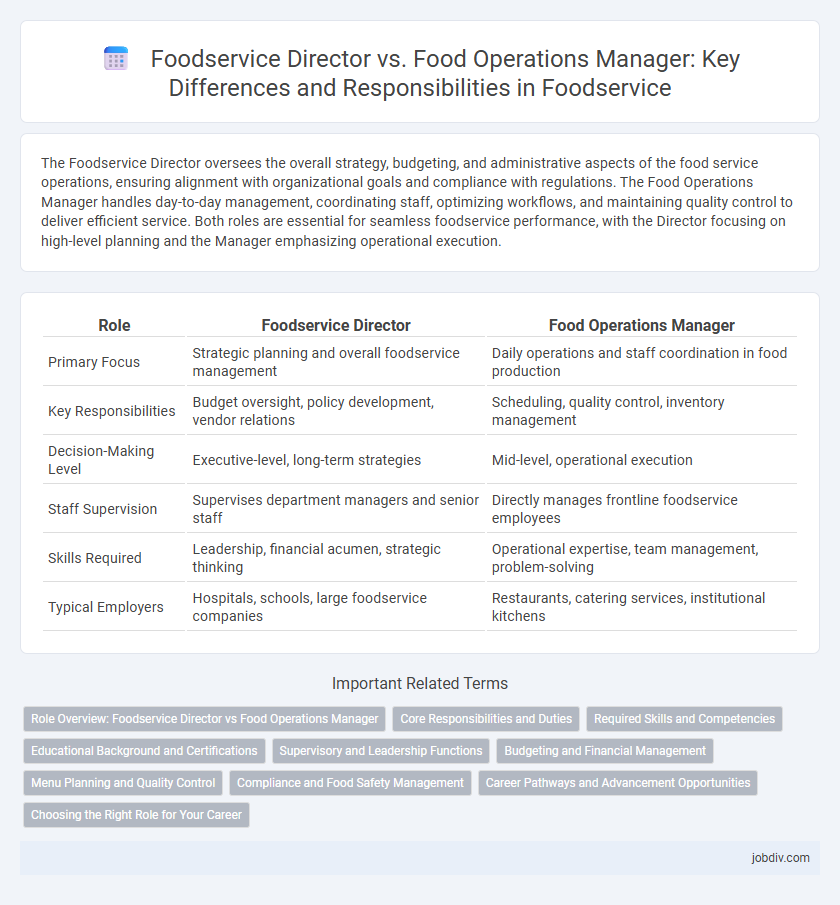The Foodservice Director oversees the overall strategy, budgeting, and administrative aspects of the food service operations, ensuring alignment with organizational goals and compliance with regulations. The Food Operations Manager handles day-to-day management, coordinating staff, optimizing workflows, and maintaining quality control to deliver efficient service. Both roles are essential for seamless foodservice performance, with the Director focusing on high-level planning and the Manager emphasizing operational execution.
Table of Comparison
| Role | Foodservice Director | Food Operations Manager |
|---|---|---|
| Primary Focus | Strategic planning and overall foodservice management | Daily operations and staff coordination in food production |
| Key Responsibilities | Budget oversight, policy development, vendor relations | Scheduling, quality control, inventory management |
| Decision-Making Level | Executive-level, long-term strategies | Mid-level, operational execution |
| Staff Supervision | Supervises department managers and senior staff | Directly manages frontline foodservice employees |
| Skills Required | Leadership, financial acumen, strategic thinking | Operational expertise, team management, problem-solving |
| Typical Employers | Hospitals, schools, large foodservice companies | Restaurants, catering services, institutional kitchens |
Role Overview: Foodservice Director vs Food Operations Manager
A Foodservice Director oversees the strategic planning, budgeting, and overall management of foodservice operations, ensuring compliance with safety standards and enhancing customer satisfaction. In contrast, a Food Operations Manager focuses on the day-to-day management of food production, staff supervision, and operational efficiency within the kitchen or food preparation areas. Both roles require strong leadership and industry knowledge, but the Foodservice Director has a broader scope involving long-term goals and organizational alignment while the Food Operations Manager emphasizes hands-on operational control.
Core Responsibilities and Duties
A Foodservice Director oversees the entire foodservice operation, focusing on strategic planning, budgeting, compliance with health regulations, and staff management to ensure high-quality food production and customer satisfaction. A Food Operations Manager manages daily activities, including inventory control, scheduling, workflow optimization, and coordination between kitchen and service staff to maintain efficient service delivery. Both roles require strong leadership and operational expertise, with directors emphasizing long-term goals and managers concentrating on tactical execution.
Required Skills and Competencies
Foodservice Directors require advanced leadership abilities, strategic planning skills, and expertise in budgeting to oversee overall foodservice operations effectively. Food Operations Managers focus on strong organizational skills, operational efficiency, and team supervision to manage day-to-day activities within foodservice establishments. Both roles demand proficiency in food safety regulations, inventory control, and customer service excellence to ensure seamless service delivery.
Educational Background and Certifications
Foodservice Directors typically hold a bachelor's degree in hospitality management, dietetics, or business administration, often complemented by certifications like the Certified Foodservice Executive (CFSE) or ServSafe Manager. Food Operations Managers usually have a similar educational background but may also possess certifications such as the Certified Food Manager (CFM) or food safety credentials specific to operational roles. Both positions benefit from knowledge in nutrition, food safety regulations, and leadership training tailored to the foodservice industry.
Supervisory and Leadership Functions
Foodservice Directors oversee overall operational strategy, staff management, and budget control, ensuring efficient service delivery and compliance with health regulations. Food Operations Managers focus on supervising daily kitchen activities, coordinating team schedules, and maintaining quality standards to optimize food production. Both roles require strong leadership skills, but Directors emphasize strategic leadership while Operations Managers concentrate on hands-on supervisory functions.
Budgeting and Financial Management
Foodservice Directors oversee comprehensive budgeting processes, ensuring alignment with organizational financial goals while managing multi-unit operations and capital expenditures. Food Operations Managers focus on day-to-day financial management, including cost control, inventory oversight, and labor expense monitoring to maximize operational efficiency. Both roles require strong proficiency in financial forecasting, variance analysis, and cost-saving strategies within the foodservice industry.
Menu Planning and Quality Control
Foodservice Directors oversee strategic menu planning to align with organizational goals, ensuring nutrient standards and customer preferences drive decisions, while Food Operations Managers focus on implementing these plans with rigorous quality control measures during food preparation and service. Directors analyze market trends and supplier options to create cost-effective and diverse menus, whereas Managers monitor daily kitchen operations to maintain consistency, safety, and compliance with health regulations. Both roles collaborate to optimize food quality, enhance guest satisfaction, and improve operational efficiency in foodservice establishments.
Compliance and Food Safety Management
Foodservice Directors oversee compliance with food safety regulations and lead the development of comprehensive safety protocols to ensure organizational adherence to health standards. Food Operations Managers implement these policies on the ground, conducting regular inspections and staff training to maintain day-to-day compliance and prevent foodborne illnesses. Both roles prioritize HACCP principles and FDA guidelines to uphold the highest standards in food safety management within foodservice establishments.
Career Pathways and Advancement Opportunities
Foodservice Directors typically oversee large-scale operations, focusing on strategic planning, budgeting, and team leadership, which positions them for advancement into executive roles like Director of Culinary Services or VP of Food Operations. Food Operations Managers concentrate on daily management, staff coordination, and process optimization, building expertise that can lead to senior management roles such as Regional Operations Manager or Facilities Manager. Both career pathways offer growth through gaining skills in leadership, financial acumen, and operational efficiency, but Foodservice Directors often have broader responsibilities and higher-level decision-making authority.
Choosing the Right Role for Your Career
Foodservice Directors oversee overall foodservice operations, strategy, and staff management, making them ideal for professionals aiming for leadership roles with broad responsibilities. Food Operations Managers focus on day-to-day operational efficiency, inventory control, and compliance, suitable for those who excel in hands-on management and process optimization. Choosing the right role depends on your career goals: strategic leadership favors Foodservice Director positions, while operational expertise aligns with Food Operations Manager roles.
Foodservice Director vs Food Operations Manager Infographic

 jobdiv.com
jobdiv.com